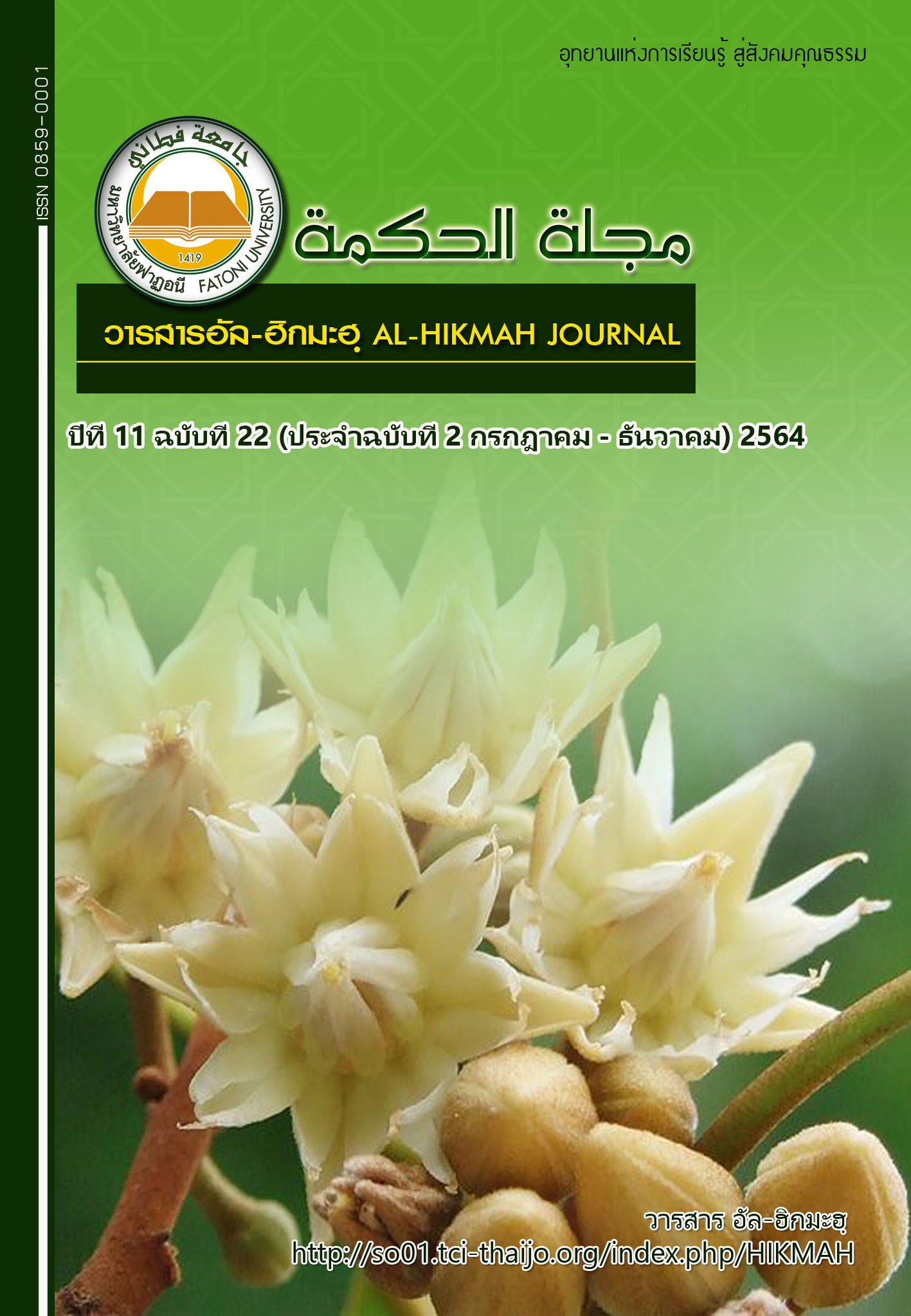The Result of Learning Management by Using Problem Based Learning towards Prayer Practice Skills on Islamic Studies Subject for Secondary School Students, Year 1
Abstract
Abstract
This research has the objective 1) To develop and find effective learning management plan by using problem-based problems on prayer practice skills. 2) to develop problem-based prayer practice skills 3) To compare students' academic achievement before and after class. Using the problem as the base 4) To assess the satisfaction of learners from studying the Islamic Studies course on learning management by using problem-based problems on prayer practice skills. Target groups used in this research are Secondary School Students, Year 1 Ban KotaBaru School KotaBaru district, Raman Amphoe, Yala Province Semester 2, Academic Year 2020, 20 students By using a specific random method (Purposive Sampling) The research instruments included 1) problem-based learning management plan There are 8 Islamic Studies courses in total of 8 hours. 2) The Salat Practice Skill Evaluation Form Using a problem-based learning management model towards prayer practice skills Secondary School Students, Year 1 Ban KotaBaru School It is a skill assessment form for prayer practice, 8 forms, 8 assessments, learning management plans, 10 points per plan. 3) a test to measure academic achievement Secondary School Students, Year 1 Ban KotaBaru School Using problem-based learning management The test is a multiple choice, with 40 questions 4 options. 4) The Student Satisfaction Evaluation Question-Based Learning Management Questionnaire on Prayer Practice Skills Secondary School Students, Year 1 Ban KotaBaru School That use learning management based on 10 problems The statistics used for data analysis are Mean, Percentage, Standard Deviation and T-Test Dependent
The results of the research were as follows
- Result for E1 / E2 of Islamic Studies Learning Plan For students in Secondary School Students, Year 1, Ban KotaBaru School By using problem-based learning management Come to compare the learning achievement of the learners According to the 80/80 standard, it was found that the learners were able to score correctly during the course of 80.25 percent and that the learners were able to score correctly after 8 percent. 0.50 Therefore, this learning management plan As effective as 80. 25 / 80.50
- Assess the prayer practice skills gained from using the problem-based learning management plan. For Secondary School Students, Year 1 students after classes have practice prayer skills Significantly higher at the .05 level
- Academic achievement before and after learning through problem-based learning management on prayer practice skills. Course in Islamic Studies For students in the secondary school year 1 after studying, have a higher score than before studying With statistical significance at the .05 level.
- The satisfaction of the learners who learned through problem-based learning management on the practice of prayer skills. Course in Islamic Studies For Secondary School Students, Year 1 after studying, the score is higher than before studying. With statistical significance at the .05 level.
Keywords: Problem-based learning management / Prayer practice skills / Islamic studies course / Secondary School Students, Year 1
References
นภัทร เบอเลอร์, หัวหน้าฝ่ายวิชาการ, สัมภาษณ์, 13 กรกฏาคม 2563
ไพฑูรย์ สินลารัตน์. (2554). หลักและเทคนิคการสอนระดับอุดมศึกษา. กรุงเทพฯ : มหาวิทยาลัยธุรกิจบัณฑิตย์.
ไพศาล สุวรรณน้อย. เอกสารประกอบการบรรยายโครงการพัฒนาการเรียนการสอน. ขอนแก่น : มหาวิทยาลัยข่อนแก่น.
ฟารีดา ดอแม. (2562). ผลของการจัดการเรียนรู้โดยใช้ปัญหาเป็นฐานที่มีต่อผลสัมฤทธิ์ทางการเรียนและทักษะการคิดแก้ปัญหาสาระการเรียนรู้อัลอัคลากสำหรับนักเรียนประถมศึกษาปีที่ 6. วิทยานิพนธ์ครุศาสตร มหาบัณฑิต สาขาวิชาการสอนอิสลามศึกษา บัณฑิตวิทยาลัย มหาวิทยาลัยราชภัฏยะลา.
สมาคมนักศึกษาเก่าอาหรับประเทศไทย. (2554). พระมหาคัมภีร์อัลกุรอานพร้อมความหมายฉบับภาษาไทย. ซาอุดิอารเบีย : ศูนย์กษัตริย์ ฟัฮดุ.
สาริญา และสุม. (2560). ผลของการจัดการเรียนรู้โดยใช้ปัญหาเป็นฐาน ที่มีต่อผลสัมฤทธิ์ทางการเรียนวิชาชีววิทยา ทักษะการสื่อสารทางวิทยาศาสตร์และเจตคติต่อวิทยาศาสตร์ ของนักเรียนชั้นมัธยมศึกษาปีที่ 6. วิทยานิพนธ์ศึกษาศาสตร์มหาบัณฑิตสาขาวิชาการสอนวิทยาศาสตร์และคณิตศาสตร์ บัณฑิตวิทยาลัยมหามหาวิทยาลัยสงขลานครินทร์.
สำนักเลขาธิการสภาการศึกษา สำนักงานคณะกรรมการการศึกษาขั้นพื้นฐาน กระทรวงศึกษาธิการ. (2553). การจัดการเรียนรู้อิสลามศึกษา ตามหลักสูตรแกนกลางการศึกษาขั้นพื้นฐาน พุทธศักราช 2551. กรุงเทพฯ : ชุมนุมสหกรณ์การเกษตรแห่งประเทศไทย จำกัด.
สุคนธ์ สินธพานนท์ และปัญญา สังข์ภิรมน์. (2550). สุดยอดวิธีสอนการงานอาชีพและเทคโนโลยีนำไปสู่การจัดการเรียนรู้ของครูยุคใหม่. กรุงเทพฯ : อักษรเจริญทัศน์.
สุวิทย์ มูลคำ . (2547). กลยุทธ์...การสอนคิดแก้ปัญหา. กรุงเทพฯ : ห้างหุ้นส่วนจำกัดภาพพิมพ์.
อบู อิบานะฮฺ ฟิตยะตุลฮัก. (2556). เศาะฮีหฺ คุณค่าของอามั้ล. สงขลา : อาลีพาณิชย์
อัฮหมัด บาฮะคีรี, วิทยากรอิสลามศึกษา, สัมภาษณ์, 13 กรกฏาคม 2563



